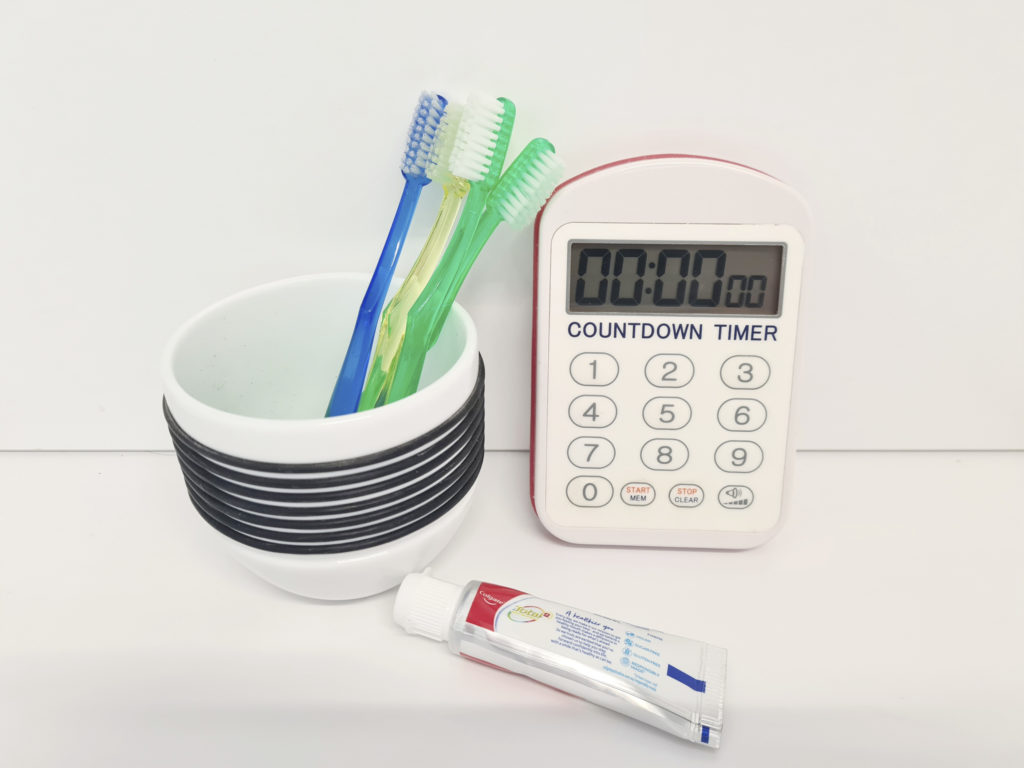Struggling to keep a date with your tooth brush?
Try these 5 tips and make teeth cleaning part of your daily routine
Cleaning your teeth probably isn’t the most exciting part of your day. When you’ve got coffee to drink, social media to catch up on and a whole family to get ready, time for teeth cleaning slips out of your routine. It doesn’t help when your dentist mentions (yet again) that you need to brush a little more often. You’ve tried, but you just can’t seem to crack it.
We understand. We’re aware of how difficult getting into the habit of brushing teeth is, but regular brushing improves your chance of needing minimal work during in-practice appointments. Shorter appointments and simpler treatments equal lower dental costs.

As well as saving you some dollars, getting into the habit of brushing your teeth helps you avoid:
- tooth decay leading to cavities,
- gum disease and
- bad breath.
More serious conditions linked to your heart and respiratory system can also be kept at bay with regular brushing and flossing. There are even some small studies suggesting a link between poor oral health and dementia. But let’s not get bogged down in doom and gloom and instead focus on how to make brushing your teeth part of your daily routine.
The official line on how often you should clean your teeth
According to the Australian Dental Association (ADA) from age 12 and up, you should aim to brush for at least two minutes, morning and night, spending around 30 seconds on each quarter of your mouth. The advice for cleaning the teeth of babies, toddlers and younger children is different.
Tips for getting into a brushing routine
If you’re thinking two minutes, twice a day is a little longer than you can spare, here are some of our favourite ideas to help you get into the habit of brushing.
1. Pick a time to brush
When you get up, after brekkie or coffee, before dropping the kids off at school, after your favourite TV show. If you’re able to find something you already do as a habit every day and tag your teeth cleaning onto the end, it eventually becomes part of your routine.
2. Put your toothbrush where you can see it
Combat the old saying, ‘out of sight, out of mind’ by keeping your toothbrush and paste somewhere where you’ll always see it. For example, leave it on the edge of a sink rather than away in a cupboard. When you’re done place it where you’ll see it during your bedtime routine. You could even put it in your work bag, gym bag or keep it in an office drawer.
3. Set a reminder
On your phone, email or an app. Make sure you add an alarm and pick a time when you won’t be busy doing something else, so you act on it rather than dismissing it. If you don’t want a daily alarm, stick a post-it note by the front door for the morning and the bathroom door for bedtime.
4. Reward yourself when you remember
You may be a little beyond getting a sticker from your dentist for good brushing, but you’re never too old to pat yourself on the back. Decide on a reward that works for you and give yourself that treat every time you remember to clean your teeth. Some reward ideas: buy something new (clothes, album, book) at the end of 30 unmissed days of brushing; take out coffee at the end of a full week of brushing; a trip to the park, pool or cinema for the kids if they brush twice a day for a whole month. Checking the time off on a calendar makes it easy to keep track of how you’re doing.
5. Set an achievable goal
Going from doing very little (or nothing) in the way of cleaning your teeth to the recommended amount is a big leap. Stay motivated by setting achievable teeth cleaning goals. For example, try brushing just once a day for a week. You can then build on your success. Pushing that goal that little bit further as you get into better and better habits will hopefully lead you to brush for two minutes, twice a day, every day.
How do you remember?
Rewards, reminders and regular times are a handful of suggestions to lead you down the path of good teeth cleaning habits. Everyone responds to something different though. Join us on Facebook where we’ve asked the group, ‘How do you remember to clean your teeth?’ Add your comments or share your tips on how you remember. It could help someone else.